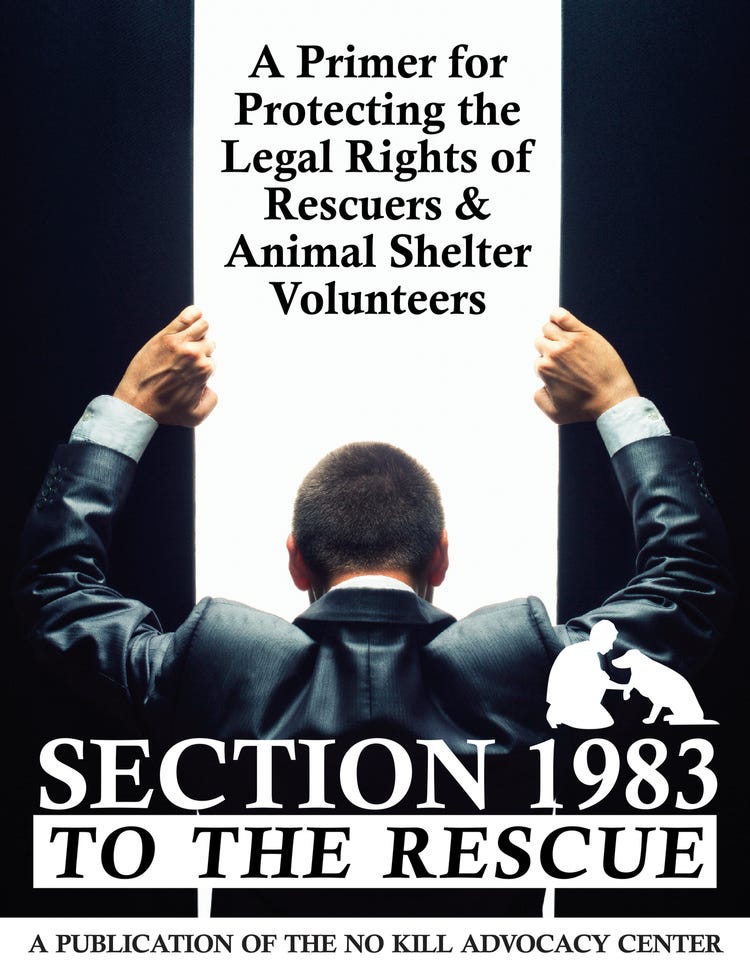Maryland: Animals in cruelty cases are not "victims"
News and headlines for March 2 - 9, 2024

In other news: volunteers have a right to expose inhumane conditions, Best Friends Animal Society honors a Wyoming pound that gasses animals, Los Angeles Animal Services threatens to kill 800 dogs in four weeks, Maryland says animals subjected to abuse are not “victims,” secondhand smoke puts dogs at risk for cancer, the definitive new guide to humane sheltering, new plant-based foods, and banning cruel glue traps.
These are some of the stories making headlines in animal protection
Over 20 volunteers who voiced concerns about what they say are inhumane conditions in the Humane Rescue Alliance’s Washington, D.C. animal “shelter” were fired by the organization. This includes those who have been volunteering for over a decade.
According to one of the volunteers, when managers and the Board of Directors ignored their concerns about the health and safety of dogs, including kennels with “lots of feces, pee, blood even, on the walls,” they took their concerns to the Mayor and City Council. They believe that is why the agency retaliated against them.
Doing so is illegal. Citizens not only have a First Amendment right to speak out against government policies with which they disagree, but they also have a constitutionally protected right to demand that the government correct the identified wrongs. As the U.S. Supreme Court has consistently ruled, “speech on public issues occupies the ‘highest rung of the hierarchy of First Amendment values’ and is entitled to special protection.” Connick v. Myers, 461 U.S. 138, 145 (1983). Indeed, such speech lies “at the heart of the First Amendment’s protection.” First Nat’l Bank of Bos. v. Bellotti, 435 U.S. 765, 776 (1978).
Although the volunteers say they were always “respectful and kind” in expressing their concerns, in Robinson vs. Hunt County, 921 F.3d 440 (2019), the Federal Court of Appeal further ruled that government officials cannot ban someone because in criticizing officials or their policies, the commenter used language those government actors considered insulting, offensive, or inappropriate:
Official censorship based on a state actor’s subjective judgment that the content of protected speech is offensive or inappropriate is viewpoint discrimination.
When animal lives are at stake — as they are when animals enter a shelter that has not fully embraced a culture of lifesaving — banning volunteers critical of policies that favor killing by government shelters is even more egregious given the life and death consequences.
As upset as she is with her firing as a volunteer, [one former volunteer] said she is most concerned with the welfare of the dogs she won’t get to help anymore.
“Just this morning I was looking at HRA’s website and the front page says ‘Volunteers Needed! Sign up today,’” she said.
To be an effective voice for animals, advocates must know their rights.
A volunteer, rescuer, or other animal lover cannot be banned from a government shelter simply because they criticized shelter management, complained about its policies and practices, or posted information that officials believe is unflattering.
Protesters are calling for an end to the gas killing of animals at Green River Animal Control in Wyoming, calling it “extremely cruel, inhumane, outdated.” They are correct. There is no progressive sheltering agency of any scope or stature willing to embrace gas systems for the killing of animals. When the chamber fills with gas, the animals inside gasp for breath, feel a searing pain in their lungs, and often claw at the chamber door or throw themselves against the sides, desperately trying to escape.
Yet, the City refuses to stop using it. It is only one of two shelters in the state using a gas chamber to kill animals (in only one of two states across the country where it is still legal). Despite the cruelty, Best Friends Animal Society gave them an award for their “achievements” as a “shelter.”
In an email to volunteers, Los Angeles Animal Services staff threatened to kill 800 dogs in four weeks if volunteers did not come up with solutions to get them adopted. In the same email, staff told volunteers they did not want to hear about the need for programmatic solutions, putting the volunteers and the dogs in a no-win scenario. After public outcry, the shelter’s General Manager backpedaled, calling the email “shocking” and “100% untrue,” even though it was reviewed and approved at the highest levels before going out.
[T]he Maryland Sentencing Commission determined that animals do not meet the criteria of “victim” for purposes of applying the multiple victim stacking rule in a criminal event with multiple counts of animal cruelty, each involving a different animal. So, if a dog fighter is caught fighting with 10, 20 or even 50 dogs only one charge against the perpetrator can be considered for purposes of applying the sentencing guidelines.
But there is hope.





